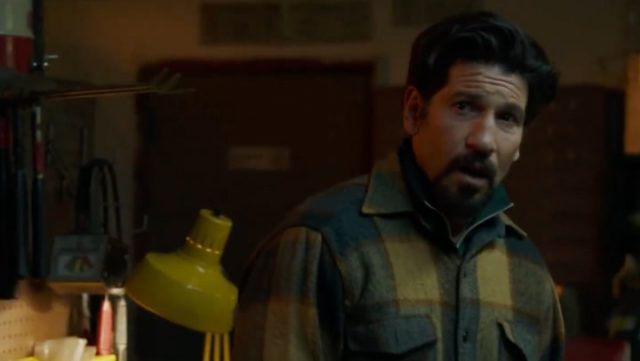Small Engine Repair: Boys Will Be Boys, by Tyler Smith

John Pollono’s crackling drama Small Engine Repair is the latest film to explore the alternately affectionate and toxic dynamic between working-class men. The unexpressed emotions and the unspoken resentments keep the audience on their toes, knowing that what might start as a pointed verbal jab can turn to violence at any moment. With all of life’s disappointments and frustrations simmering just below the surface, the stage is set for a particularly volatile thriller, and Pollono – who adapts his own stage play – mostly manages to take the story and characters in directions that feel satisfying yet uncompromising. In the traditions of films like Husbands, Glengarry Glen Ross, and 25th Hour, Small Engine Repair invites us to examine a car crash that hasn’t yet happened, but soon will.
The story unfolds over several years, though the bulk of the film takes place over the course of one potentially fateful night. Three estranged childhood friends living in a blue-collar neighborhood gather together to put aside their differences and rekindle their friendship. The events take place at the small engine repair shop of Frank (Pollono), a single father whose daughter Crystal (Ciara Bravo) has been accepted to UCLA. His friends, Packie (Shea Whigham) and Swaino (Jon Bernthal), have helped Frank raise Crystal since she was a little girl and are excited to see her make something of herself. However, Frank soon reveals that there is more to this recent attempt at reconciliation than meets the eye. A cocky young college student named Chad (Spencer House) arrives on the scene and Frank gets a little cagey. What is eventually revealed about Chad and his relationship to Frank – or, more specifically, Crystal – fits nicely into Pollono’s exploration of masculinity and hedonism. The tension mounts and it becomes increasingly difficult to predict what will happen from one moment to the next.
Given the contained nature of the film, it’s not surprising that it is based on a play, though Pollono effectively manages – primarily through flashbacks – to move the action out of the repair shop from time to time. The film’s theatrical roots also reveal themselves through the heightened nature of the performances and plot revelations. While the unpredictable tone of the film remains consistent, circumstances change so abruptly that the audience is regularly required to quickly reassess exactly what kind of movie it’s watching. Somehow these drastic shifts usually play better on the stage, whereas here they can be so jarring that they remove us from the action.
Thankfully, Pollono’s stellar cast – ably led by Pollono himself – is able to navigate these complicated narrative and emotional waters, reacting to each new revelation with believable incredulity and panic. As Swaino, Bernthal continues in his niche of playing charismatic and unstable men whose standoffish view of the world makes them a sort of ticking time bomb. House has the difficult job of playing a type more than an actual character, and he does what he can to ground Chad in a recognizable confidence that suggests more fear and insecurity than he is letting on. And the always-dependable Shea Whigham excels as the soft-spoken conscience of the group, whose attempts to be a better man are often undercut by his own upbringing and nature.
All of these elements come together to paint a portrait of masculinity that is at once noble but wholly unsustainable. These men are loyal to each other and more than willing to sacrifice themselves for a cause they believe in. Moreover, they are able to acknowledge their own volatile instincts and seem eager to change, while never quite understanding how to acquire and utilize the tools with which to do so. The dynamic between these men – whose friendship could just as easily be described as adversarial if seen through a different lens – is often difficult to watch, as their upbringing, class, and culture trap them in a cycle of behavior they seem unable to get out of. At times, the film feels like a full-on indictment, but Pollono’s script is too smart for that. Rather than stand above the action and judge these characters, Pollono puts us right in the middle of it, so that we can see what truly motivates these men. The film adopts a tone of tragedy without ever becoming patronizing.
That the film can be sad, suspenseful, and tender-hearted all while maintaining a pretty consistent level of humor speaks to Pollono’s understanding of these characters, and of friendship itself. While we may not appreciate all of the jokes told by these men, we are nonetheless able to enjoy their chemistry. Our characters’ lives may be somewhat depressing, but that doesn’t mean that our characters themselves are depressed. Like anybody else, they like to laugh and enjoy each other’s company, and it is the inclusion of this basic fact that helps to ground the more outlandish elements of the film.
In the end, Small Engine Repair is a bit uneven in its plotting but is consistently engrossing in its execution. The way in which John Pollono introduces and explores his characters and their very limited world suggests a maturity and a desire to truly understand, where it would have been so easy to simply reduce, judge, and dismiss. In a culture that is increasingly eager to write off those that might be seen as crass or backward-thinking, a bit of empathy is a welcome – though not necessarily easy – respite.




























